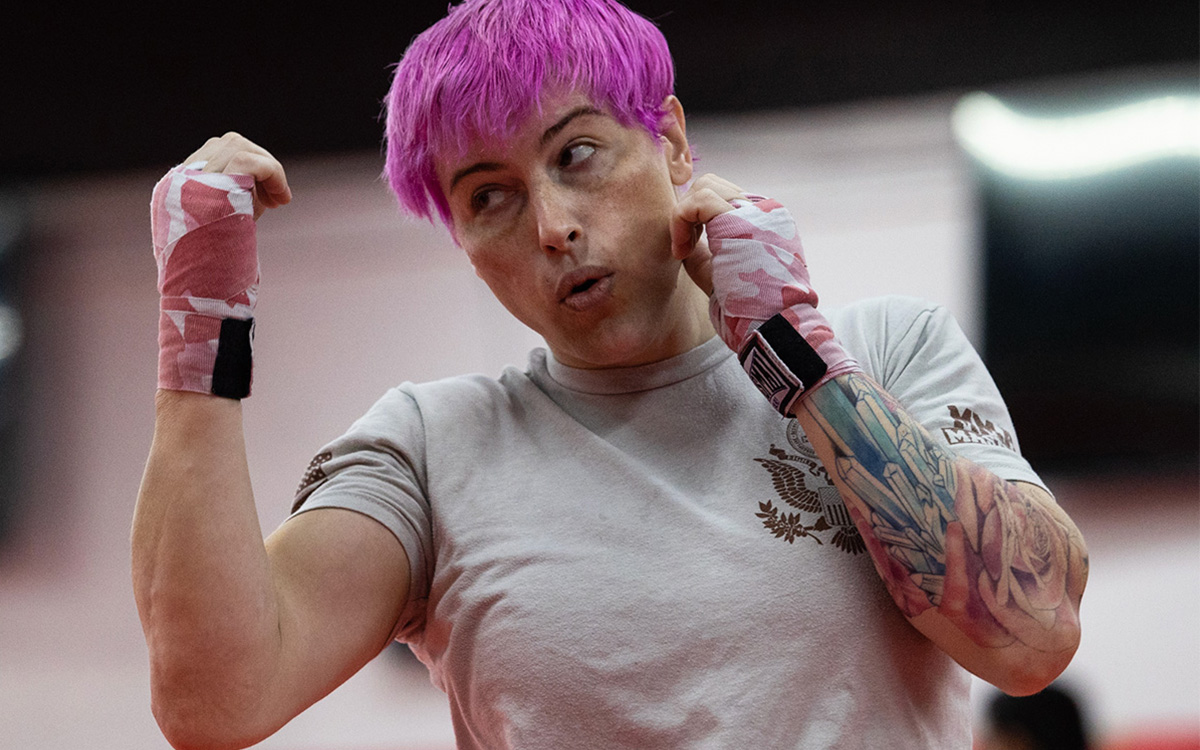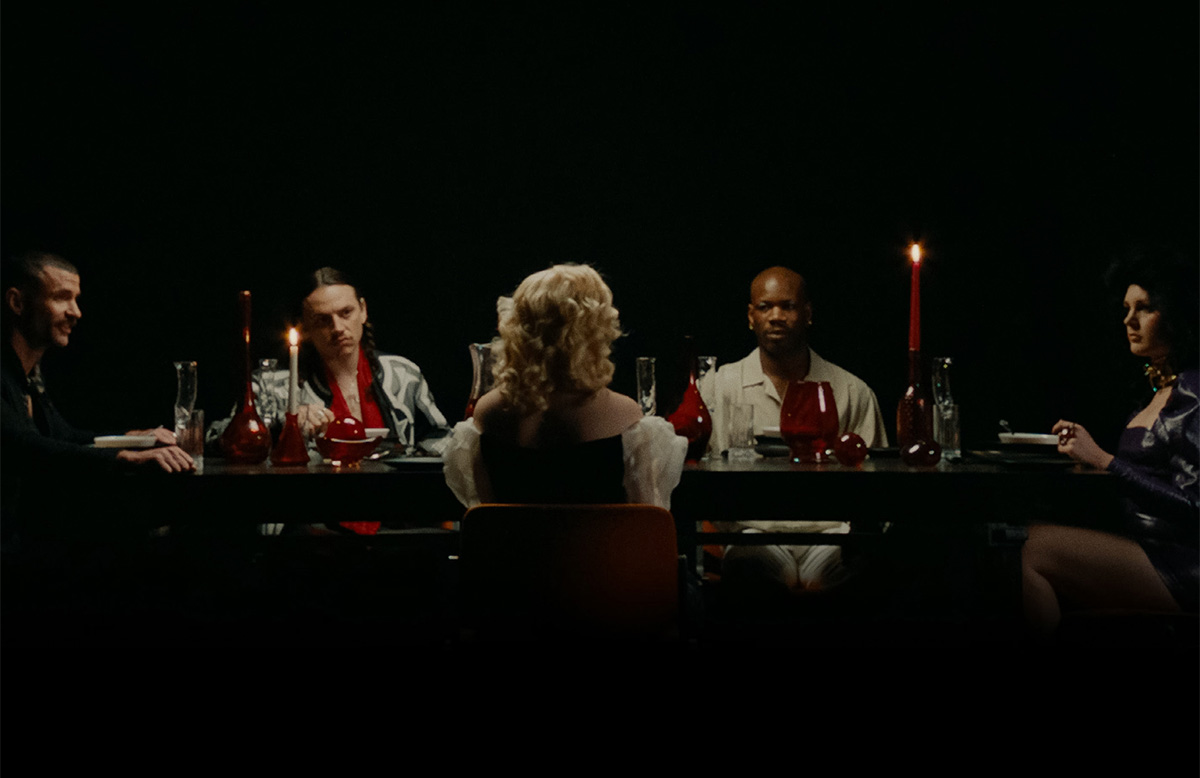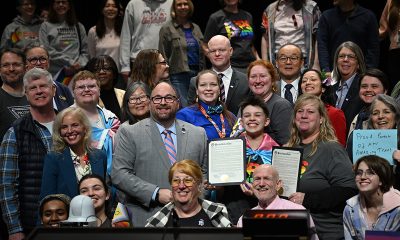Movies
Trans MMA star battles prejudice in ‘Unfightable’ doc
A harrowing, heartbreaking, inspiring portrait of Alana McLaughlin

It’s no surprise that the fall movie landscape finds an unusually large number of films – most of them documentaries – about trans people and the challenges they face in trying to achieve an identity that matches their own sense of self.
Transgender rights or even acceptance have never been in such a precarious place within the American political landscape since queer rights were acknowledged at all in the mainstream conversation. After eight years of ramped-up efforts by anti-trans activists to essentially legislate them out of legal existence, trans people find themselves facing a divisive and uncomfortably close election that will likely have an existential impact on their future, accompanied by persistent and vocal efforts by the conservative right-wing crowd to ostracize and stigmatize them within public perception. They’re not the only target, but they are the most vulnerable one – especially within the evangelical strongholds that might swing the election one way or the other – and that means a lot of conservative crosshairs are trained directly on them.
It’s a position they’re used to, unfortunately, which is precisely why there are so many erudite and artistic voices within the trans community emerging, prepared by years of experience and education gained from dealing with persistent transphobic dogma in American culture, to illuminate the trans experience and push back against the efforts of political opportunists by letting their stories speak for themselves. Surely there is no weapon against hatred more potent than empathy – once we recognize our own reflection in those we demonize, it’s hard to keep ourselves from recognizing our shared humanity, too – and perhaps no more potent way of conveying it than through the most visceral artistic medium of all: filmmaking
Particularly timely, in the wake of an Olympics marked by controversy over the participation of Algeria’s Imane Khelif and Taiwan’s Lin Yu-ting in the women’s competition, is “Unfightable,” from producer/director Marc J. Perez. Offering up a harrowing, heartbreaking, and ultimately inspiring portrait of Alana McLaughlin – a U.S. Army Special Forces sergeant who, following gender transition, turned female MMA fighter only to face resistance and transphobic prejudice within the rarified cultural microcosm of professional sports – while also taking a deep dive into the world of Mixed Martial Arts and the starkly divided attitudes of those who work within it, it aims to turn one person’s trans experience into a metaphor for the struggle of an entire community to be recognized and accepted on its own terms. For the most part, it succeeds.
Unlike many such biography-heavy documentaries, “Unfightable” allows its subject – the charismatic and outspoken McLaughlin, whose presence rightly dominates the film and leaves the most lingering impression – to narrate her own story, without interpretation or commentary from “talking head” experts. From the grim-but-all-too-familiar story of her upbringing in a deeply religious family (and yes, conversion “therapy” was involved) through her struggle to define her identity via a grueling military career, her eventual transition, and her emergence as only the second transfeminine competitor in the professional MMA arena and beyond, Perez treats most of the movie’s narrative thrust like an extended one-on-one interview, in which McLaughlin delivers the story as she experienced it. This one-on-one honest expression is effectively counterpointed by the rhetoric of other MMA personalities who participated in the film, some of which is shockingly transphobic despite protestations of having “nothing against” trans people.
At the same time, the film acknowledges and amplifies supportive voices within the MMA, whose efforts to bring McLaughlin into the fold were not only successful, but ultimately led to her victorious 2021 match against French fighter Celine Provost. It’s a tale that hits all the touchstone marks of queer/trans experience for those whose lives can’t really begin until they break free of their oppressive origins, and whose fight to claim an authentic life for themself is frequently waged against both the families who ostensibly love them and the prejudices of a society eager to condemn anything that deviates from the perceived “norm”. Naturally, as a story of individual determination, self-acceptance, and success against the odds, its main agenda is to draw you in and lift you up; but it does so while still driving home the point about how far the road still stretches ahead before trans athletes – and by extension, trans people in general – are afforded the same legitimacy as everyone else.
To ensure that reality is never forgotten or taken lightly, we are offered some pretty egregious examples; from prominent fighters who insist they “have no problem” with trans people as a preface for their transphobic beliefs about trans athletes, to McLaughlin’s long wait before finding another MMA pro who was willing to fight her we are confronted with a pattern of prejudice blocking her path forward. And though it documents her triumph, it reminds us that three years later, despite her accomplishments, she has yet to find another MMA pro willing to give her another bout.
If nothing else, though, “Unfightable” underscores a shift in attitudes that reflects the progress – however slow or maddeningly hard-won it may be – of trans people carving out space for themselves in a social environment still largely hostile to their success or even their participation. As McLaughlin’s journey illustrates, it takes dogged persistence and a not-insignificant level of righteous anger to even pierce the skin of the systemic transphobia that still opposes the involvement of people like her in sports; her experience also bears witness to the emboldened bigotry that has doubled-down on its opposition to trans acceptance since the 2016 election of a certain former president who is now seeking a second chance of his own – highlighting the dire consequences at stake for the trans community (and, let’s face it, the entire queer community alongside every other group deplored and marginalized by his followers) should his efforts toward a comeback prove successful.
Yet as grim an outlook as it may acknowledge, “Unfightable” doesn’t leave viewers with a belief in sure defeat; in the toughness of its subject – who is, as it proudly makes clear, a veteran of combat much more directly dangerous than anything she will ever encounter in the ring – and her refusal to simply give up and go away, it kindles in us the same kind of dogged resistance that fueled her own transcendence of a toxic personal history and allowed her to assert her identity – triumphantly so, despite the transphobia that would have kept her forever from the prize.
That’s a spirit of determination that we all could use to help drive us to victory at the polls come November. Like Alana McLaughlin, we have neither the desire nor the ability to go back to the way our lives were before, and Perez’s documentary helps us believe we have the strength to keep it from happening.
“Unfightable” opened for a limited release in New York on Sept. 13 and begins another in Los Angeles on Sept. 20. It will air on ViX, the leading Spanish-language streaming service in the world, and in English on Fuse TV, following its theatrical run.
Movies
Stellar cast makes for campy fun in ‘The Parenting’
New horror comedy a clever, saucy piece of entertainment

If you’ve ever headed off for a dream getaway that turned out to be an AirBnB nightmare instead, you might be in the target audience for “The Parenting” – and if you also happen to be in a queer relationship and have had the experience of “meeting the parents,” then it was essentially made just for you.
Now streaming on Max, where it premiered on March 13, and helmed by veteran TV (“Looking,” “Minx”) and film (“The Skeleton Twins,” “Alex Strangelove”) director Craig Johnson from a screenplay by former “SNL” writer Kurt Sublette, it’s a very gay horror comedy in which a young couple goes through both of those excruciatingly relatable experiences at once. And for those who might be a bit squeamish about the horror elements, we can assure you without spoilers that the emphasis is definitely on the comedy side of this equation.
Set in upstate New York, it centers on a young gay couple – Josh (Brandon Flynn) and Rohan (Nik Dodani) – who are happily and obviously in love, and they are proud doggie daddies to prove it. In fact, they are so much in love that Rohan has booked a countryside house specifically to propose marriage, with the pretext of assembling both sets of their parents so that each of them can meet the other’s family for the very first time. They arrive at their rustic rental just in time for an encounter with their quirky-but-amusing host (Parker Posey), whose hints that the house may have a troubling history leave them snickering.
When their respective families arrive, things go predictably awry. Rohan’s adopted parents (Edie Falco, Brian Cox) are successful, sophisticated, and aloof; Josh’s folks (Lisa Kudrow, Dean Norris) are down-to-earth, unpretentious, and gregarious; to make things even more awkward, the couple’s BFF gal pal Sara (Vivian Bang) shows up uninvited, worried that Rohan’s secret engagement plan will go spectacularly wrong under the unpredictable circumstances. Those hiccups, and worse, begin to fray Josh and Rohan’s relationship at the edges, revealing previously unseen sides of each other that make them doubt their fitness as a couple – but they’re nothing compared to what happens when they discover that they’re also sharing the house with a 400-year-old paranormal entity, who has big plans of its own for the weekend after being trapped there alone for decades. To survive – and to save their marriage before it even happens – they must unite with each other and the rest of their feuding guests to defeat it, before it uses them to escape and wreak its evil will upon the world.
Drawing from a long tradition of “haunted house” tropes, “The Parenting” takes to heart its heritage in this campiest-of-all horror settings, from the gathering of antagonistic strangers that come together to confront its occult secrets to the macabre absurdity of its humor, much of which is achieved by juxtaposing the arcane with the banal as it filters its supernatural clichés through the familiar trappings of everyday modern life; secret spells can be found in WiFi passwords instead of ancient scrolls, the noisy disturbances of a poltergeist can be mistaken for unusually loud sex in the next room, and the shocking obscenities spewed from the mouth of a malevolent spectre can seem as mundane as the homophobic chatter of your Boomer uncle at the last family gathering.
At the same time, it’s a movie that treats its “hook” – the unpredictable clash of personalities that threatens to mar any first-time meeting with the family or friends of a new partner, so common an experience as to warrant a separate sub-genre of movies in itself – as something more than just an excuse to bring this particular group of characters together. The interpersonal politics and still-developing dynamics between each of the three couples centered by the plot are arguably more significant to the film’s purpose than the goofy details of its backstory, and it is only by navigating those treacherous waters that either of their objectives (combining families and conquering evil) can be met; even Sara, who represents the chosen family already shared by the movie’s two would-be grooms, has her place in the negotiations, underlining the perhaps-already-obvious parallels that can be drawn from a story about bridging our differences and rising above our egos to work together for the good of all.
Of course, most horror movies (including the comedic ones) operate with a similar reliance on subtext, serving to give them at least the suggestion of allegorical intent around some real-world issue or experience – but one of the key takeaways from “The Parenting” is how much more satisfyingly such narrative formulas can play when the movie in question assembles a cast of Grade-A actors to bring them to life, and this one – which brings together veteran scene-stealers Falco, Kudrow, Cox, Norris, and resurgent “it” girl Posey, adding another kooky characterization to a resume full of them – plays that as its winning card. They’re helped by Sublett’s just-intelligent-enough script, of course, which benefits from a refusal to take itself too seriously and delivers plenty of juicy opportunities for each of its actors to strut their stuff, including the hilarious Bang; but it’s their high-octane skills that bring it to life with just the right mix of farcical caricature and redeeming humanity. Heading the pack as the movie’s main couple, the exceptional talent and chemistry of Dodani and Flynn help them hold their own among the seasoned ensemble, and make it easy for us to be invested enough in their couplehood to root for them all the way through.
As for the horror, though Johnson’s movie plays mostly for laughs, it does give its otherworldly baddie a certain degree of dignity, even though his menace is mostly cartoonish. Indeed, at times the film is almost reminiscent of an edgier version of “Scooby-Doo”, which is part of its goofy charm, but its scarier moments have enough bite to leave reasonable doubt about the possibility of a happy ending. Even so, “The Parenting” likes its shocks to be ridiculous – it’s closer to “Beetlejuice” than to “The Shining” in tone – and anyone looking for a truly terrifying horror film won’t find it here.
What they will find is a brisk, clever, saucy, and yes, campy piece of entertainment that will keep you smiling almost all the way through its hour-and-a-half runtime, with the much-appreciated bonus of an endearing queer romance – and a refreshingly atypical one, at that – at its heart. And if watching it in our current political climate evokes yet another allegory in the mix, about the resurgence of an ancient hate during a gay couple’s bid for acceptance from their families, well maybe that’s where the horror comes in.
Movies
Indie filmmaking is the gift that keeps giving this season
Jacob Elordi delivers strong performance in ‘On Swift Horses’

With all the anti-LGBTQ bias currently being forced down America’s throat by its own government, you might think that the coming season would be bringing us slim pickings when it comes to movies by, for, and/or about our community.
As the list of highlights we’ve compiled for you below clearly shows, you would be wrong. While there are few big studio offerings among them (are there ever?), we are happy to say that the blessing of indie filmmaking is a gift that keeps shining through, with several titles from outside the dominant mainstream system to pique your interest until the summer blockbusters come rolling out.
Young Hearts (March 14, limited release) A Belgian-Dutch co-production that racked up an impressive number of awards and prizes on the festival circuit, this queer coming-of-age story centers on a rural 14-year old (Lou Goossens) who befriends a new neighbor boy (Marius De Saeger) from the big city and finds himself falling in love for the first time. Described by its director (Anthony Schattemen, in his feature filmmaking debut) as a movie he “needed or wanted to see” in his own youth, it’s a queer-centered romance with universal appeal for viewers of all ages, who will easily recognize the strong emotions it evokes as it explores the struggle of of growing up while trying to discover your own identity. Goossens’ performance has been widely praised, as has Schatteman’s direction, and its suitability for family viewing makes it an even more appealing choice in a time when young queer people might be feeling particularly in need of positive messaging.
Pet Shop Days (March 14, limited release) Another European festival contender, this UK romantic thriller directed by Olmo Schnabel centers on an impulsive young immigrant (Darío Yazbek Bernal) who flees his wealthy Mexican family and lands in New York, where he becomes involved with a young pet shop clerk (Jack Irv) and is drawn into an underworld of crime and unrestrained vice. A sexy romance bolstered by the presence of several acclaimed screen veterans – including Willem Dafoe, Peter Saarsgard, and Emmanuelle Seigner – and with the prestige of a Venice Film Festival premiere behind it, it has a built-in appeal for queer cinema buffs.
A Nice Indian Boy (April 4) From Independent Spirit Award-winning director Roshan Sethi comes another touch of queer romance, though its premise – an Indian-American doctor (Koran Soni) falls in love with a white art photographer (Jonathan Groff) and takes him home to win the approval of his deeply traditional immigrant family – is arguably just as stressful as a crime drama set in the underbelly of NYC. Even so, it comes with a collection of enthusiastic reviews from its festival run, and offers a refreshing twist on the “culture clash” rom-coms that typically deliver the reverse ethnic dynamic when it comes to the challenge of bringing someone from outside the community to “meet the parents.” It also offers the charms of both Tony-winner Groff and Soni (“Abbott Elementary”), whose chemistry only enhances their “cute couple” appeal. Sunita Mani, Harish Patel, and Zarna Garg also star.
The Wedding Banquet (April 18) One of the highest-profile queer big screen prospects of the season is yet another rom-com, but this one is also a remake. Out gay Korean-American filmmaker Andrew Ahn (“Spa Night,” “Fire Island”) helms a reinvention of Ang Lee’s now-classic “marriage-of-convenience” comedy of the same name in which two same-sex couples (Bowen Yang and Han Gi-Chan, Lily Gladstone and Kelly Marie Tran) concoct a “lavender wedding” for a green card in exchange for in vitro fertilization, only to find themselves trapped into an elaborate, traditional Korean marriage ceremony by the closeted-at-home groom’s revered grandmother (Oscar-winner Youn Yuh-jung). Well received at its Sundance premiere earlier this year, and also featuring acclaimed veteran actress Joan Chen (“Lust, Caution,” “Twin Peaks,” “Didi”) as the mother of the bride, this one has serious potential to become the must-see rom-com – queer or otherwise – of the season.
On Swift Horses (April 25) A literary adaptation – from the eponymous novel by Shannon Pufahl – set in post-Korean War California, this romantic drama revolves around a returning veteran (Will Poulter) eager to start a brand new life with his bride (Daisy Edgar-Jones); when his younger brother (Jacob Elordi) joins them, the trio form a family together – but both bride and brother have secret desires that remain unmet, leading each to explore their individual romantic and sexual impulses and threatening to pull the happy household apart. Highly touted after its 2024 Toronto Film Festival premiere, this one reportedly boasts “it” boy Elordi’s strongest performance to date (along with some steamy scenes shared with Diego Calva as his clandestine lover) and gives equal time to the ladies by pairing Edgar-Jones with Sasha Calle as her own secret same-sex flame. Along with “The Wedding Banquet,” this is probably the most-anticipated queer movie of the year so far. Directed by Daniel Minahan.
Lilies Not for Me (TBA) Though its release date hasn’t been set yet, this multinational production from first-time director Will Seefried is worth watching out for. Another period piece, this one follows an aspiring novelist (Fionn O’Shea) in 1920s England who enters a medical facility to undergo “conversion therapy” for his homosexuality. It might sound like a horror film, but it’s really a drama that unwinds the complex psychological process of coming to terms with your sexual identity, and the connections between past, present, and future which trace the path toward acceptance. Also starring Erin Kellyman, Robert Aramayo, Louis Hoffman, and Jodi Balfour.
Movies
In LaBruce’s ‘The Visitor,’ the revolution will be sexualized
Exploring the treatment of ‘otherness’ in a society governed by xenophobia

If any form of artistic expression can be called the “front line” in the seemingly eternal war between free speech and censorship, it’s pornography.
In the U.S., ever since a 1957 Supreme Court ruling (Roth v. U.S.) made the legal distinction between “pornography” (protected speech) and “obscenity” (not protected speech), the debate has continued to stymie judicial efforts to find a standard to define where that line is drawn in a way that doesn’t arguably encroach on First Amendment rights – but legality aside, it’s clearly a matter of personal interpretation. If something an artist creates features material that depicts sexual behavior in a way that offends us (or doesn’t, for that matter), no law is going to change our mind.
That’s OK, of course, everyone has a right to their own tastes, even when it comes to sex. But in an age when the conservative urge to censor has been weaponized against anything that runs counter to their repressive social agenda, it’s easy to see how labeling something as too “indecent” to be lawfully expressed can be used as a political tactic. History is full of authoritarian power structures for whom censorship was used to silence – or even eliminate – anyone who dares to oppose them. That’s why history is also full of radical artists who make it a point to push the boundaries of what is “acceptable” creative expression and what is not.
Indeed, some of these artists see such cultural boundaries as just another way for a ruling power to enforce social conformity on its citizens, and consider the breaking of them not just a shock tactic but a revolutionary act – and if you’re a fan of pioneering countercultural filmmaker Bruce LaBruce, then you know that’s a description that fits him well.
LaBruce, a Canadian who rose to underground prominence as a writer and editor of queer punk zines in the ‘80s before establishing himself as a photographer and filmmaker in the “Queercore” movement, has never been deterred by cultural boundaries. His movies – from the grit of his gay trick-turning comedy “Hustler White,” through the slick pornographic horror of “LA Zombie,” to the taboo-skewering sophistication of his twin-cest romance “St. Narcisse” – have unapologetically featured explicit depictions of what some might call “deviant” sex. Other films, like the radical queer terrorist saga “The Raspberry Reich” and the radical feminist terrorist saga “The Misandrists,” have been more overtly political, offering savagely ludicrous observations about extremist ideologies and the volatile power dynamics of sex and gender that operate without regard for ideologies at all. Through all of his work, a cinematic milieu has emerged that exists somewhere between the surreal iconoclasm of queer Italian provocateur Pier Paolo Pasolini and the monstrous camp sensibility of John Waters, tied together with an eye for arresting pop art visuals and a flair for showmanship that makes it all feel like a really trashy – and therefore really good – exploitation film.
In his latest work, he brings all those elements together for a reworking of Pasolini’s 1968 “Teorema,” in which an otherworldly stranger enters the life of an upper class Milanese family and seduces them, one by one. In “The Visitor,” Pasolini’s Milan becomes LaBruce’s London, and the stranger becomes an impressively beautiful, sexually fluid alien refugee (burlesque performer Bishop Black) who arrives in a suitcase floating on the Thames. Insinuating himself into the home of a wealthy family with the help of the maid (Luca Federici), who passes him off as her nephew, he exerts an electrifying magnetism that quickly fascinates everyone who lives there. Honing in on their repressed appetites, he has clandestine sex with each in turn – Maid, Mother (Amy Kingsmill), Daughter (Ray Filar), Son (Kurtis Lincoln), and Father (Macklin Kowal) – before engaging in a incestuous pansexual orgy with them all. When the houseguest departs as abruptly as he arrived, the household is left with its bourgeois pretensions shattered and its carnal desires exposed, each of them forced to deal with the consequences for themselves.
Marked perhaps more directly than LaBruce’s other work with direct nods to his influences, the film is dedicated to Pasolini himself, in addition to numerous visual references throughout which further underscore the “meta-ness” of paying homage to the director in a remake of one of his own films; there are just as many call-backs to Waters, most visibly in some of the costume choices and the gender-queered depiction of some of its characters, but just as obviously through the movie’s “guerilla filmmaking” style and its gleefully transgressive shock tactics – especially a dinner banquet sequence early on which leisurely rubs our noses in a few particularly dank taboos. There are also glimpses and echoes of Hitchcock, Kubrick, Lynch, and other less controversial (but no less challenging) filmmakers whose works have pushed many of the same boundaries from behind the veneer of mainstream respectability.
Despite all of these tributes, however, “The Visitor” is pure LaBruce. Celebratory in its depravity and unflinching in its fully pornographic (and unsimulated) depictions of sex, from the blissfully erotic to the grotesquely bestial, it seems determined to fight stigma with saturation – or at least, to push the buttons of any prudes who happen to wander into the theater by mistake – while mocking the fears and judgments that feed the stigmas in the first place.
That doesn’t mean it’s all fluid-drenched sex and unfettered perversion; like Pasolini and his other idols, LaBruce is a keenly intellectual filmmaker, and there’s a deeper thread that runs throughout to deliver an always-relevant message which feels especially so right now: the treatment of “otherness” in a society governed by homogeny, conformity, and xenophobia. “The Visitor” even opens with a voiceover radio announcer lamenting the influx of “brutes” into the country, as suitcases bearing identical immigrants (all played by Black) appear across London, and it is by connecting to the hidden “other” in each of his conquests that our de facto protagonist draws them in.
LaBruce doesn’t just make these observations, however; he also offers a solution (of sorts) that matches his fervor for revolution – one in which the corruption of the ruling class serves as an equalizing force. In each of the Visitor’s extended sexual episodes with the various family members, the director busts out yet another signature move by flashing propaganda-style slogans – “Give Peace of Ass a Chance,” “Go Homo,” and “Join the New Sexual World Order” are just a few colorful examples – that are as heartfelt as they are hilarious. In LaBruce’s revolution, the path to freedom is laid one fuck at a time, and it’s somehow beautiful – despite the inevitable existential gloom that hovers over it all.
Obviously, “The Visitor” is not for all tastes. But if you’re a Blade reader, chances are your interest will be piqued – and if that’s the case, then welcome to the revolution. We need all the soldiers we can get.
“The Visitor” is now playing in New York and debuts in Los Angeles March 14, and will screen at roadshow engagements in cities across the U.S. Information on dates, cities, and venues (along with tickets) is available at thevisitor.film/.
-

 Virginia5 days ago
Virginia5 days agoFairfax County School Board issues Trans Day of Visibility proclamation
-

 Trinidad and Tobago5 days ago
Trinidad and Tobago5 days agoTrinidad and Tobago recriminalizes homosexuality
-

 National2 days ago
National2 days agoDestination Tomorrow works to empower LGBTQ community
-

 Maryland2 days ago
Maryland2 days agoAt transgender visibility celebration, Moore called out for lack of action











